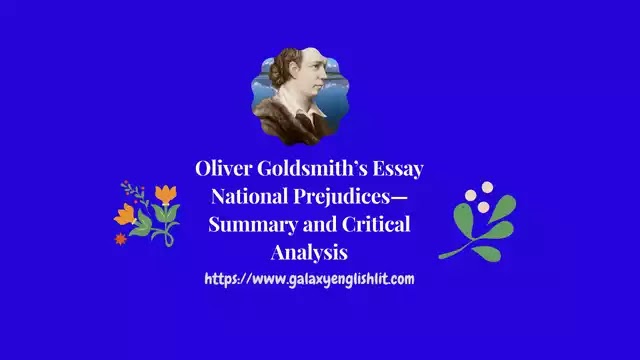Introduction:
G. M. Hopkins was a deeply religious man. He was an ardent believer in God and in the divinity of Christ. He had a strong ascetic strain in his temperament. He saw God everywhere and especially in the objects of Nature. In every poem of G. M. Hopkins, the presence of God or Christ is felt, but he seems to doubt Him, which makes him suffer tortures. In the end his triumph over his doubts prevails and he affirms the benign nature of God, which makes his heart feel elated and joyed. His despondency disappears and the daylight of hope shines on him.

His religious element in “The Habit of Perfection”: When Hopkins was hardly twenty two years old he wrote “The Habit of Perfection” which indicates his desire to become a priest. In this poem he surrenders himself to the ideal of asceticism. In the first two stanzas he writes that writing poetry is opposed to his spiritual aspirations. He elects “Silence” which is conducive to spiritual contemplation. He vows to deny to himself all the pleasure of senses, the eyes must see only “the uncreated light” — the creative energy of God, the palate must be content with fasting, the nostrils must smell only the fragrance of the incense burnt in the church, the feet must walk to the church: and poverty must be the poet's house.
The Wreck of the Deutschland:
“The Wreck of the Deutschland” is his greatest religious poem. The poet does not mourn the wreck or the loss of human lives but gives a picture of his own spiritual vicissitudes and interprets the shipwreck as a revelation of God. The poem opens with an invocation to God, “giver of breath and bread”, and “the lord of living and dead”. God has made and unmade the poet. The poet, then, recalls the spiritual stress and strain which he has undergone, and God's grace that he has achieved. He sees God “under the world's splendour and wonder”. Then he writes, “Be adored among men, God. Thou art lighting and love, I found it, a winter and warm.” The Part I of the poem concludes with a prayer to god to show His mercy to all. The devotional temper permeates Part II also. The poem closes with the same spiritual fervour with which it opened.
The religious element in his sonnets:
Of all the sonnets of 1877, “The Windhover” is the most remarkable and eloquent devotional sonnet. The sub - title “To Christ Our Lord” emphasises its religious significance at the outset. In the sonnet Christ is not mentioned but the falcon is treated as a symbol of him. The epithets used for the falcon can be applied to Christ as well the morning's minion; kingdom of daylight's dauphin (the crown prince, that means son of God, Christ). The pride, the valour, and the plume refer to the bird's struggle against the elements, a struggle which is symbolic of Christ's struggle against the forces of evil. The poet through suffering and mortification for the sake of Christ hopes to get God's mercy. In the best terrible sonnet “Carrion Comfort”, the poet declares his resolve not to take recourse to despair that feeds on spiritual death. The poet, then, turns to Christ who is behind despair and asks why he has been rude towards him by making him undergo all sufferings. These sufferings are punishment from Christ to purify him of his imperfections as the whirlwind separates the chaff from the grains. The poet accepts the wrath of God, kisses His rod held by His benign hand that showers love on the poet. The poet feels cheering both himself and God. In the end the poet pays humble adoration to God or Christ, and all doubts about Christ vanish.
Conclusion:
God in his poems is a being who can be refused, wrestled with, and surrendered to. He is terrible but also merciful. He is to be found through sorrow for sin. God is the master of all. He is sweet beyond the power of words to say. He is all love, but He punishes man to purify him of his weaknesses and imperfections. He is the ruler of heaven and wrings the world but His purpose is always benign and benevolent.





